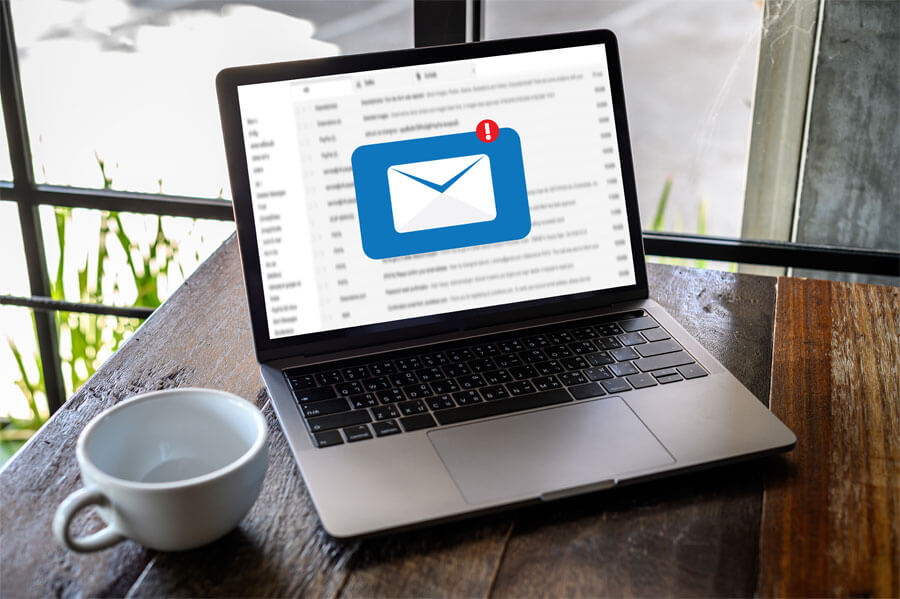A tenant information update form is an official document meant for landlords or property managers to collect updated information from their tenants.
These details are required on an annual, quarterly, and bi-annual, or whenever significant changes to the tenant’s situation occur. The form should include your tenant’s name, contact details, emergency contact information, and any changes since the lease agreement was signed.
This document guarantees accurate record-keeping and constant communication between a landlord and their tenants. This means you can provide your tenants with better services, improve their living experience, and quickly respond to their needs. Another benefit of using this form is that it allows you to effectively prepare for emergencies or communicate with the tenant’s family in case of an incident.
In this article, you will learn more about when to use this form, how to prepare it, and what to include in it. Free templates in different formats (Word and PDF) are also provided for your ease.
Free Forms
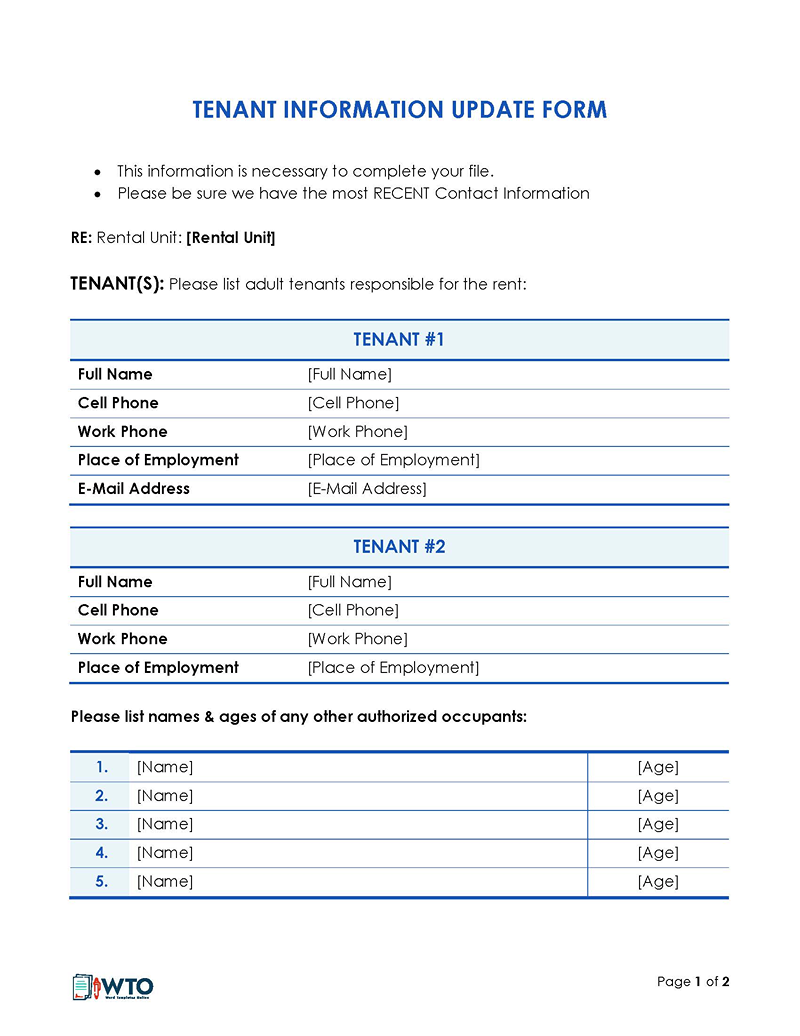

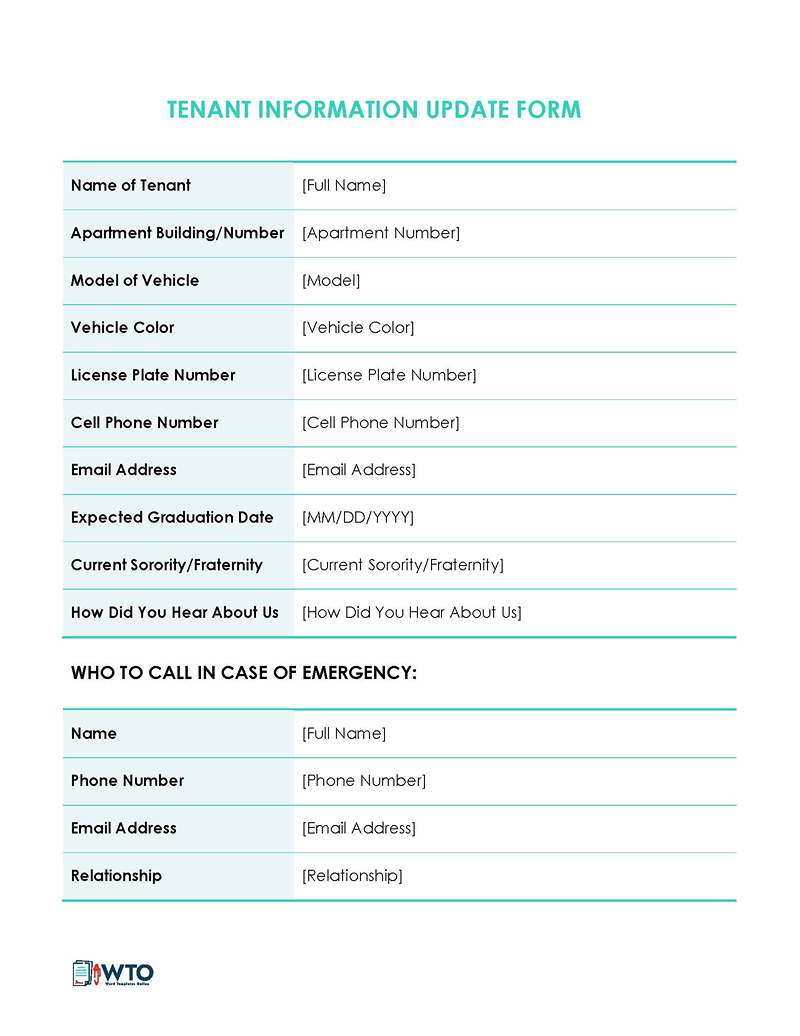
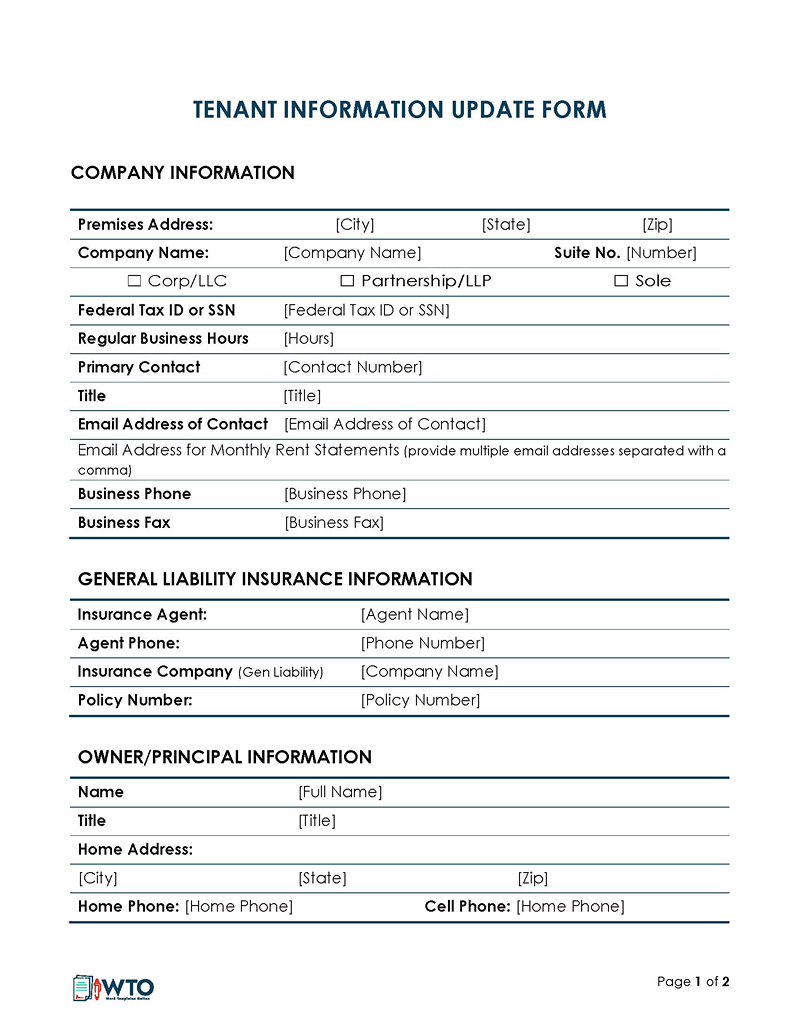
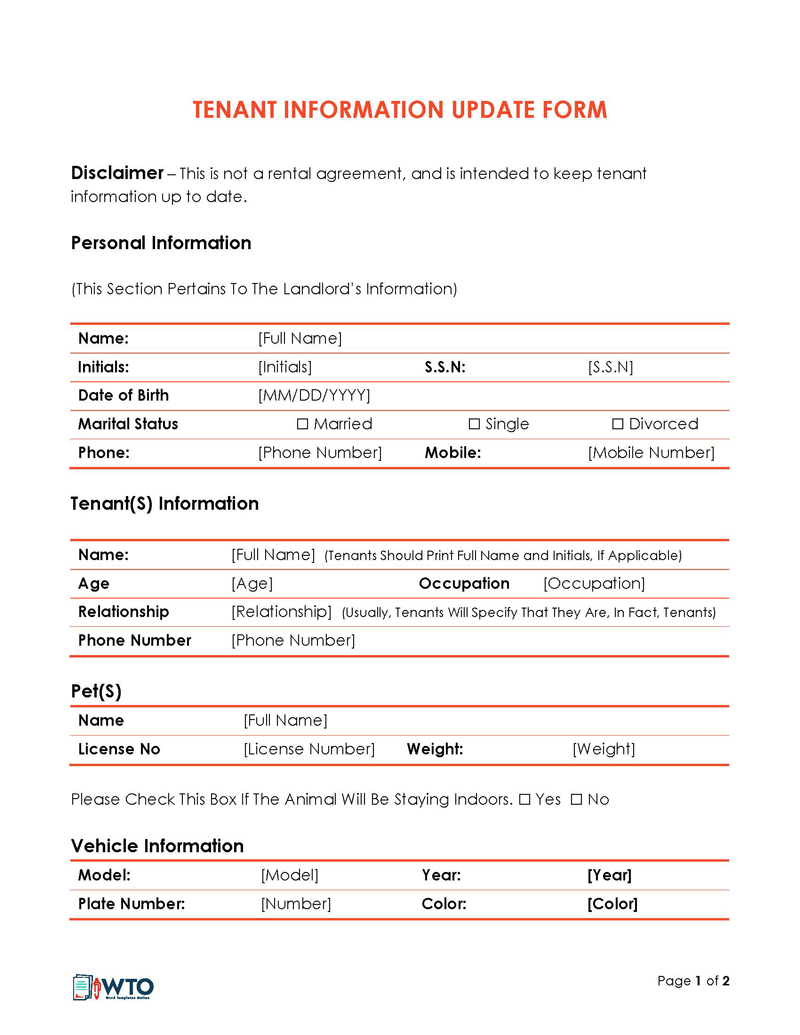
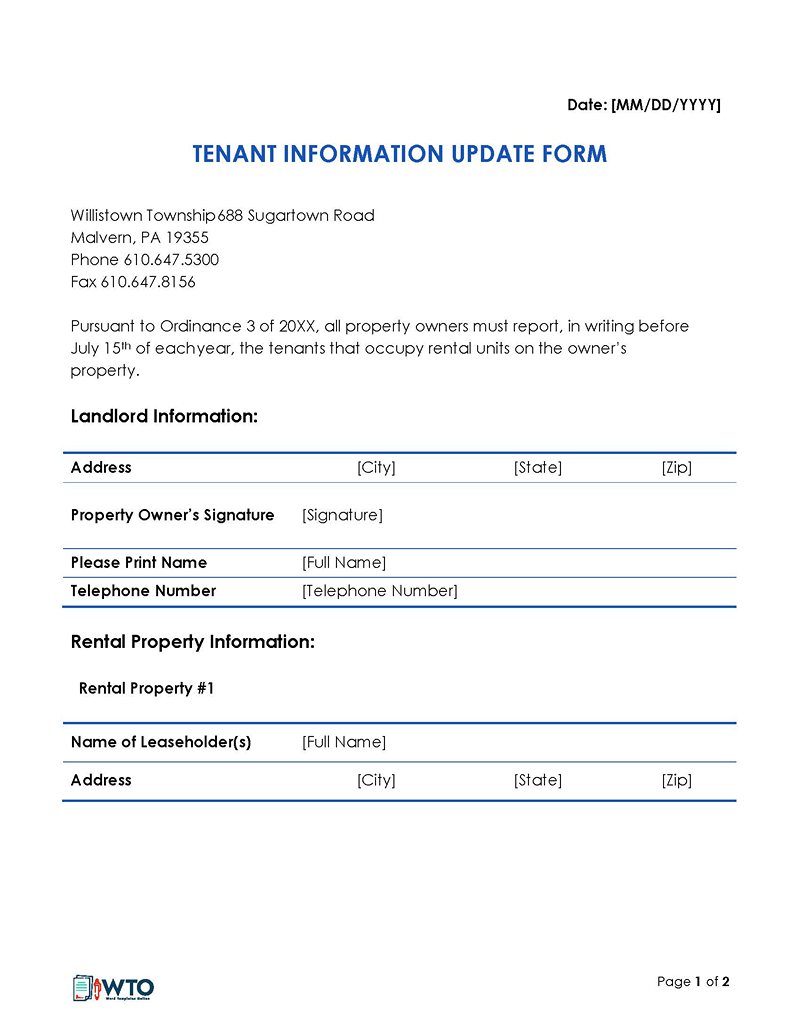
Scenarios in Which the Information Update Form is Used
You can use an information update form in the following situations to keep your tenants’ records accurate and up-to-date:
- If a tenant has moved or changed their phone number or email address, they would need to fill out an information update form to provide the new contact information to the landlord or property manager.
- If an additional tenant becomes part of an existing lease agreement, you should use this form to update their details.
EXAMPLE
If the tenant gets married, engaged, or has a child, you must update their information to include the additional tenant.
- This form can be used when you want to change or update the details of the tenant. This may include their phone number or emergency contact information. This enables free communication between you and the tenants.
- This form can be used when a tenant moves out. It allows you to update the details of the vacated unit while preparing for a new tenant to occupy it.
- If a tenant’s employment or income status changes, they may need to fill out an information update form to provide the new information to the landlord or property manager.
- If a tenant’s emergency contact information has changed, they would need to update the form to provide the new contact information to the landlord or property manager.
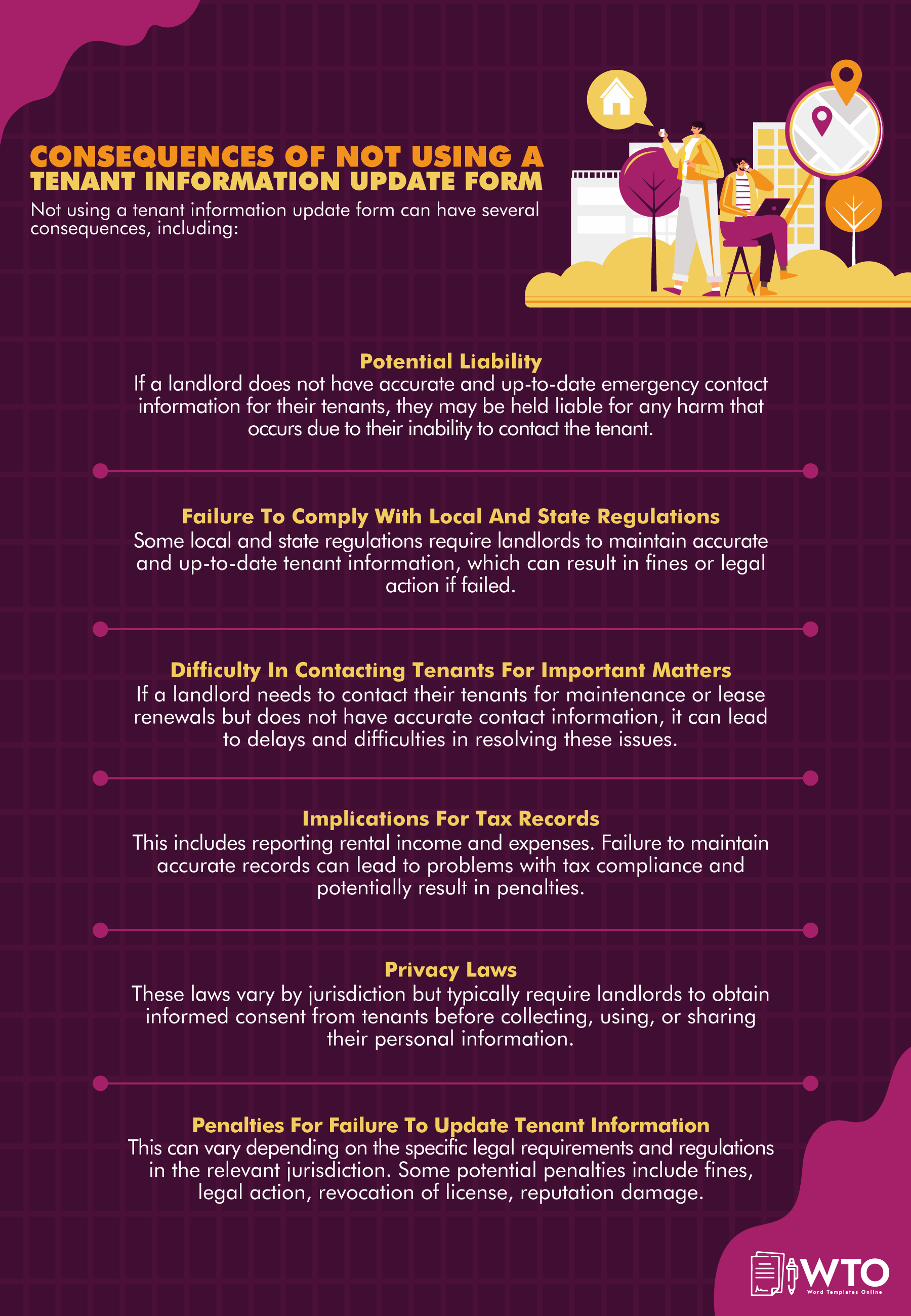
Tenant Information Form VS. Tenant Information Update Form
A tenant information form is typically used at the beginning of a new tenancy, and it collects the initial information from the tenant. This information includes their name, employment status, rental history, ability to pay rent, and emergency contact details. The landlord or property manager uses this form to ascertain the correct details and gauge whether the applicant can afford rent.
On the other hand, an update form is a document used by a landlord or property manager to keep the tenant’s details up-to-date. Notably, this form should be used once the tenant has occupied the property. It should be provided to tenants periodically, such as annually or when there is a change in their details. This form can be used to update details such as their contact details, employment or income status, emergency contacts, and rental payment information.
Process of Updating Tenant Information Using a Form: 7 Key Steps
When managing rental properties, it’s important to keep tenant information up-to-date. One effective way to do this is by using the form. This form allows landlords or property managers to easily collect and organize tenant information in a standardized format.
To ensure a smooth and efficient process, here are seven key steps to follow when updating tenant information using a form:
Step 1: Determine the need for necessary information
Determining the details that should be updated is important. Updating tenants’ contact details, emergency contacts, employment status, and other relevant details can make communication between you and tenants quick and effective. Also, updating such details enables you to manage the property properly and keep it conducive and safe for the tenants.
Step 2: Create the form
Develop a standardized form that includes all the necessary information to be updated. This form should be easily accessible to tenants, either by providing a hard copy or a digital version that can be downloaded from your website or sent by email.
TIP
When creating the form, use simple language and avoid asking for unnecessary details, which may hinder the tenant from completing the form.
Step 3: Distribute the form
Once the form is created, you can distribute it in a manner deemed appropriate to you and the tenants. Therefore, you can distribute via email, deliver a hard copy via mail, or deliver them in person when doing a routine inspection on the property.
Step 4: Set a deadline for the return
After giving the forms to tenants, you can set a deadline by which the tenants should return the accurately and properly filled forms. The deadline ensures you get enough time to review the information in the forms and update it.
Step 5: Review the information
Once you receive the updated forms, review the information provided and verify its accuracy. If there are any discrepancies or missing information, contact the tenant to clarify.
TIP
To avoid receiving forms with missing or inaccurate information, you should provide clear instructions on how to complete these forms. You can provide examples to help them accurately complete the form.
Step 6: Update your records
After receiving the completed forms, you can add the updated information to the tenant’s records. Once you have verified the information, update your records and make any necessary changes to tenant accounts and leases.
Step 7: Confirm updates
Send a confirmation letter or email to tenants to confirm that their information has been updated in your system.
What to Include in a Tenant Information Update Form
When preparing the form to update your tenant’s information, there are several details to include:
Introductory notice
An introductory notice in the form typically includes a brief explanation of why the form is being used and a request for the tenant to review and update their information. This notice may also include any important deadlines or instructions for completing the form. The purpose of the notice is to inform the tenant about the form and encourage them to take the necessary steps to update their information on time.
Tenant’s personal information
The form should include the tenant’s personal information, which includes their name, date of birth, marital status, social security number, phone number, and email address.
NOTE
Note that the form must be completed by the tenant(s) who signed the original lease agreement.
Occupants
In this section of the form, include the details of other occupants residing on the property in question. These are occupants who did not sign the lease agreement, for instance, relatives, friends, and children. Therefore, the name, occupation, age, and the tenant’s relationship with the occupant(s) should be outlined.
Emergency contact information
Emergency contact details are crucial, as they offer another option to communicate with the tenant. Some of the details needed in this section include their name, phone number, address, email, and relationship with the tenant.
Pet information
If a tenant owns a pet or intends to get one, you should request that they provide all the necessary information about their pet. This information includes its name, type, breed, and weight. Furthermore, the tenant should indicate whether the pet will stay indoors or outside.
Vehicle details
If a tenant owns a car, you should request that they provide all the necessary information about their vehicle to be included in the form. This information is crucial, as it allows you to allocate a parking space for the tenant within the property. Therefore, they should indicate the year it was manufactured, the model, its color, and the license plate number.
Employment information
Whether a tenant is employed or self-employed, you should request that they give you their employment information. This information is meant to ascertain that the tenant can generate income and pay their rent on time. Therefore, you should ask them to provide details about their employer, their profession, the number of hours spent at work per week, their supervisor and their contact details, the email address and address of the organization, and the years they have been employed.
Income details
Ensure that you also request that the tenant provide accurate information about their income in the form. This includes their current income, the source(s) of income, and proof of income, such as a salary certificate or an income tax return.
Tenant’s signature
Both you and your tenant should provide your signatures at the end of the form. These signatures authenticate the form.
NOTE
Note that if more than one tenant occupies the unit, each of them should sign this form.
Date
It is imperative to incorporate the date in the form to ensure the accuracy of tenant information and to establish a comprehensive record of their details.
Summary
Having updated information about tenants is crucial for landlords, as it allows them to effectively manage their properties. Knowing important details such as current contact information, emergency contacts, and lease terms can help landlords communicate with tenants in case of emergencies, maintenance requests, or lease renewals. Landlords have legal obligations to maintain accurate records of their tenants, and having updated information can help ensure compliance with local and state laws and regulations. Therefore, you should ensure that you update your tenant’s information regularly.
A tenant information update form is used to record any changes to the tenant’s circumstances. Ideally, you should provide these forms to tenants regularly, such as once a year. By using this form, landlords can easily gather the necessary information from tenants and keep their records accurate and organized. In addition to guiding how to create the form, we also offer free templates in this article that can be easily customized to suit your specific needs.







